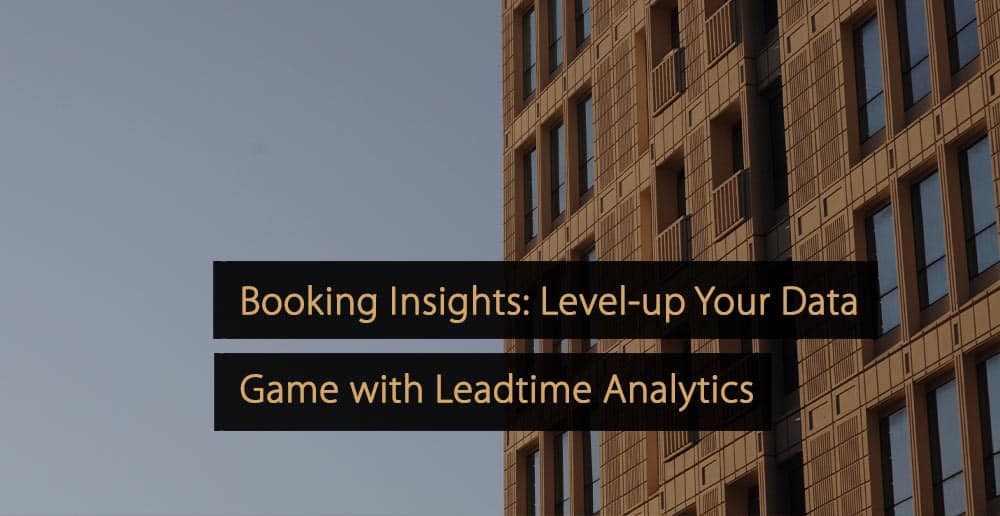Question for Our Revenue Management Expert Panel:
With historic data now less relevant as we move into post-pandemic recovery, what forward-looking data is a “must-have” for hotels?
Industry Expert Panel
Our Industry Expert Panel exists out of professionals within the hospitality & travel Industry. They have comprehensive and detailed knowledge, experience in practice or management and are forward-thinking. They are answering questions about the state of the industry. They share their insights on topics like revenue management, marketing, operations, technology and discuss the latest trends.
Our Revenue Management Expert Panel
- Chaya Kowal – Director of Revenue Management, Potato Head Family
- Paulo Aragao – Revenue Management Professional
- Theresa Prins – Founder, Revenue Resolutions
- Andrew Wheal – Founder & Chief Techspert, Hospitality Tech Expert
- Patrick Wimble – Managing Director, Lightbulb Consulting
- Heiko Rieder – Vice President Revenue Management and Reservations, Penta Hotels
- Edyta Walczak – Cluster Revenue Manager, Arora Hotels
- Pablo Torres – Hotel Consultant, TSA Solutions
- Jutta Moore – Director, Moore Hotel Consulting
- Thibault Catala – Founder, Catala Consulting
- Karin van Rhee -Lecturer, Hotel Management School Maastricht
- Silvia Cantarella – Revenue Management Consultant, Revenue Acrobats
- Tanya Hadwick – Group Revenue & Yield Leader, SunSwept Resorts
- Massimiliano Terzulli – Revenue Managent Consultant, Franco Grasso Revenue Team
- Daphne Beers – Owner, Your-Q Hospitality Academy
- Naveed Mirza – Corporate Director of Revenue Management, Helix Hospitality
- Mariska van Heemskerk – Owner, Revenue Management Works
- Ask Our Panel a Question
- Join Our Expert Panel
“While historic data is not really relevant anymore and your current OTB might not provide enough insights, you need to look more closely at other elements.
I would say that it’s time to “unlearn” certain elements of decision-making in Revenue Management, i.e., it’s time to start thinking outside the box and taking more risks. Unless you put your offers out there and test them, you won’t really know what’s working and what’s not!
Lead times have drastically changed. While some markets will book really last-minute, others that used to book last-minute are now shifting to booking further in advance. Day-of-the-week or weekend trends are changing and there is no longer a specific seasonality anymore.
Your old data, in terms of market segments, might not help. In the past, if your OTAs were producing the most, followed by WHO and then Direct (for example), this might change when you re-open post-pandemic. Some hotels are seeing WHO topping their production for example.
Domestic Trends:
For many destinations (especially with travel restrictions), the domestic market is currently the only producing market. For the next 3-6 months, this will continue to be the primary market for many destinations. It’s important to understand the behaviour of this market.
International market – Special Bubble arrangements / Travel corridors between specific countries:
How will travel restrictions influence customer behaviour?
How the consumer behaviour is changing in terms of buying and what are they looking for? For example, there is an increase in demand for sustainable products / resorts, activities where guests can make a difference in the life of local people or participate in authentic experiences, Digital nomads, plant-based food etc. and adapting your offerings – those who are proactive and pioneers of change and sustainability will definitely be at an advantage here.
A few main elements to keep track of: competition, demand, travel restrictions being lifted (increase in flights, special events,) analyzing competitor pricing / room type etc.
Search traffic data:
You easily get these from OTAs for example (for your city / destination/ location) and it will help analyze upcoming trends – which countries are the most searches coming from? What kind of LOS are they looking at? What travel dates are peaking? Flight search data is also helpful here to understand trends.
Based on demand and specific market insights, you can create geo- promos for your property.
Being up-to-date with what the local authorities are doing for tourism for your destination is also important to help align your actions and optimize sales.
Finally, it’s important to work on driving revenue across the hotel rather than just rooms; from day packages & night packages to experience packages that all cater to the changing behaviours and demands of customers (wellness, F&B, digital nomads, etc.).”
“There are a few future-looking sets of data that hotels should be focusing on. The first one is about cancellations. Cancellations data was probably never taken as seriously as it is taken now. The hotel must turn to cancellation information, and the more detailed, the better. What is the cancellation window for reservations in the next two weeks? What was the reason for the cancellation? What is the impact on revenue by the refunded bookings and are there negative reviews about the non-refunded ones?
Hotels need to customize their denials criteria and empower the Reservations team to be detailed about the reasons around clients cancelling or denying a booking. Answering all these questions should give insights into how demand is reacting to the news, to the hotel’s price, to regulations, to safety and cleaning practices, to border restrictions, etc.
Another important forward-looking data now is vaccination rates. The good news is that hotels probably do not have to go too far: the vaccination rate of the state in which it’s located should give good light. As the population attempts to build up herd immunity, travellers will be more confident to go on short trips, usually by car. Leisure travel is already happening like that and the numbers are growing in many locations.
Also, I believe remote work has fundamentally changed our perception of job and location, and mobile communities are rising. Alternative accommodations are spearheading the race; therefore, it is important for hotels to be looking at all short-term vacation rental demand information available, and to include those listings as part of the competitive set.”
“Historical data is used to analyse customer behaviour, but in addition, this repeated information over years showed seasonality. Current data for future bookings of your own property is vital, as this shows us current customer behaviour and with using this new behaviour, we can forecast new trends on which we must act to optimise revenue.
Competitive pricing data has become more relevant than before, but not to follow a price war, rather to determine the demand of your competitors.
STR data plays an important role with forward bookings, but this is something that has not taken off in South Africa. Forward bookings of your competitor set, broken into market segments, gives amazing insight into demand patterns.
Depending on your geographical location, you may need to follow demand behaviour in other countries and then draw assumptions on your demand needs.”
“Whilst historical data has become less ‘reliable’ in the last couple of years as a barometer by which we can gauge future demand, new metrics are providing fresh insights. One of the newest and most actionable data points is to review the amount of hits on the website and booking engine and to understand from where those hits are coming and what they are looking for.
Several Revenue Management software solutions now not only look at your competitor data in terms of booking trends, but they also review a raft of google analytics data for hotel websites, city searches and even search data on visitor attractions.”
“The obvious one is booking pace, i.e., understanding how bookings for particular periods have changed versus the period prior. This should also be looked at by segment. But looking at future pace data by market from a variety of sources such as OTA insight, STR etc., will be critical in understanding changes that are happening in the market but might not yet have been reflected in the hotel’s booking pace. This could enable you to make informed decisions rather than simply reacting to pace data.
Keeping an eagle eye on your competitors’ rates will continue to be important. However, we all know that we are “at the mercy of our dumbest competitor” so not simply following our competitors will also be key.”
“With travel restrictions opening up in due course, we will see more postponed events being re-scheduled with short notice, therefore a minimum requirement would be a tool to alert Revenue Management of any newly announced events and the expected number of visitors. This is to not miss out on revenue opportunities, as the RMS forecast (which bases its forecast on historic data) will not pick up the trend fast enough.
More precise information to generate a demand forecast will be delivered from forward-looking on-the-books data, occupancy rates at the least, from competitive or industry sets. If reliable, this data should ideally interact with the algorithm of the RMS or at least be available in the RMS for reference (as opposed to using it on separate applications). The challenge with forward-looking data providers can be that data coverage is mostly limited to the large global and less regional brands or individual hotels.”
“There are many tools and reports available, however often they also use historical data to predict the demand and therefore they are not as useful as they used to be. Forward Stats provided by STR come in very useful, looking at the forward pace in a wider market and an understanding of the new lead time helps to plan and implement a stronger rate strategy.
Some meaningful data can be found on OTA’s reporting. TravelClick Pace reports can likewise provide us with some insights of forward BOB for their specific channel. The key is to monitor international travel trends, governments’ roadmaps etc. Also, understanding the lead time of the property (by segment, DOW, channel).”
“Having an up-to-date tech stack is key. A market intelligence tool can show very useful information on anything from flight patterns (both bookings and searches), to a comp set, showing info on both hotels and private accommodation, events going on in the city, etc.
Besides that, knowing your guests is vital. But not just their birth date or address. The focus must go into knowing their loyalty and their spending pattern; how often they return, which day of the week, the rate booked, ancillary revenue, etc. There is still a challenge for revenue managers to properly know their guests, and without that information, it’s not possible to create micro-segmented campaigns worth launching.”
“At property level, your business-on-the-books, pick-up and understanding pace & lead times are key.
Ideally, you would also have a tool, either through a revenue management system or a script on your booking engine, that will capture overall demand, so not just bookings but also regrets & denials. This will enable a better understanding of demand so that pricing opportunities can be identified & captured
It is also key to know & understand the demand for your market, destination and competitor set.
Tools like OTA Insight’s Market Insight, STR’s forward data or Travelclick’s Demand 360 can be really helpful here. However, in the absence of those tools and bit more labour intensive, a quick search on the OTA’s for key dates can also indicate whether there is compression in your market for those dates.”
“The current pandemic has forced organizations to adapt and adjust their reporting processes to make more accurate business decisions. The pandemic is a massive black swan’s event and we have no idea how markets/customers will react in the future. What worked in the past, may not work in the future. Therefore, this is now more important than ever to analyse future trends & forward-looking data in order to forecast future business conditions; the main goal being to better understand and better align present business practices for greater future success.
A few reports and metrics can help hoteliers get started with forward-looking data, yes by looking at short term historical data, but also with a focus on future trends. For example:
- Week on Week pick-up: 8 week rolling average to understand where the trend line is heading.
- Month on Month increase in Revenue (ratio of Occupancy vs ADR)
- Benchmark versus the market (STR) – with LY and Budget targets less relevant the key mission of a revenue management team is to beat the market.
Forward-looking data is not a crystal ball prediction and with the technology available nowadays it’s merely guesswork. There are several solutions in the market today to access hotel forward-looking data (such as STR Forward, OTA Market Insights, Google Destinations, TripAdvisor Spotlight, etc.). Hotels that leverage forward-looking data to better understand the future and prepare themselves accordingly will be the ones to experience a faster recovery and will drive better market shares.”
“Year-on-year comparisons are indeed useless for at least another year. Without these traditional YoY comparisons that our industry has been heavily dependent on, forward-looking market data becomes even more important. For example, looking at new market trends, new booking behaviour of different segments and channels, etc.
Another valuable insight would be looking at month on month comparisons. Are performance and trends seen in May repeating themselves in June? Now that travel is starting to slowly recover, it’s essential to closely monitor pick-up trends.”
“Travel research on the booking engine to understand where the travel intentions are, what kind of rooms the guests are looking for, for which dates, what occupancy, from what countries are they searching – all these types of insights are usually available through the Booking Engine provider and it is great to understand the trends by geo-source, helping you to work on specific geo-targeted offers. Google Hotel Insight is a great tool to monitor demand, together with the open dashboards that many partners have made available to support hotel post-pandemic by giving access to data on travel intentions and bookings.
For example, the UNWTO tourism recovery tracker. Many others can be consulted for free, together with data insights and publications e.g., from Sojern, THN, Amadeus, OTA insight, Forward Keys and STR global. Benchmarking tools (such as STR forward data) to get information on the future occupancy of your market of reference are also useful, as are flight searches and travel restriction listings.”
“Relying on OTB data has always had challenges. However, we have been lucky in the industry as there are a number of ways to monitor market demand. I am a fan of STR Forward STAR, OTA Insights, TravelClick Demand 360, as these enable you to assess performance Vs competitors and/or market – and anything that enables you to look at trends within the market enables you to benchmark more effectively.
Along with the majority of the industry, I have been enjoying the STR COVID webinars – if you haven’t had the pleasure, go take a look. As an industry, and perhaps more as a discipline, the support from groups and platforms offering insights across markets have really shown a key advantage to all weathering this unprecedented times as well as possible. Google Analytics is also a great source to better understand the consumer buying behaviour changes, and perhaps overall less panic based on booking trend changes. I believe that revenue management is always evolving and as such, I believe we will see more tools.”
“I do not entirely agree with the statement that historical data is less relevant. This might perhaps have been the case in March 2020, at the onset of the pandemic. However, more than a year has passed since the start of the pandemic, and we have an enormous amount of historical and scientific data that can be tapped into.
By historical data, I am not necessarily referring to performance data (occupancy, ADR and RevPar etc.), but rather scientific data related to epidemiological trends, the curves mapping how the virus responds to people’s social behaviour, climatic and environmental factors, vaccines, variants, natural antibodies, the assumptions that if x happens y will probably happen, etc., as these are all aspects that end up having repercussions on political decisions and individual and social freedoms, and therefore also on the demand that can be expected for a hotel in the short and medium-term.
These are forecasts, of course, but they are based on historical and scientific data. Not to mention that a useful historical fact is not necessarily the data corresponding to the same day or week of the previous year, but it can also be the data from a week ago or a weekend ago, as is indeed the case particularly for city hotels at present.
Conversely, there are certain destinations, especially holiday, domestic and seasonal spots (seaside, lakeside, mountain etc), which have been less affected by the consequences of the pandemic and where hotels had a better performance in 2020 than in 2019. In this case, historical data (year-on-year) continues to be enormously important.
Having said that, the usefulness of the most recent historical data (one day, one week, or one month ago) must be skillfully mixed with the analysis of future data, such as the number of visitors to portals and websites, requested dates, and origin of visitors, air traffic data, metasearch engines, restrictions to and from a specific country, data on the resumption of events and conferences, etc.
In 2022, when hopefully the pandemic will be nothing but a bad memory, we will once again handle historical data (with 2019 being the reference point) as we always have.”
“It all starts with a long term vision to ensure that your strategy translates into short and long term actions – and an authentic, continuous strategy will be more important than ever. Some key data sources and analysis can make a huge difference in the way we make our commercial decisions; for example:
- Comparison of markets/ regions/ countries that are ahead of your market in this crisis, to predict your own recovery.
- The changes in your feeder markets will play a big role in adapting strategy, pricing and distribution channels.
- Guest behavioural analysis will play a part to secure business in these challenging times.
- Risk management assessments.
- Comparison to other major crisis situations and data on the recovery process and steps.”
“Having a clear understanding of the needs of your different client types is really important right now; as is monitoring your current lead time, the international holiday schedules and any travel restrictions that may affect movement.
I think historic data keeps being relevant – but the Revenue Manager must be able to spot differences in the trends and act on them accordingly.
That being said, analysis of historic data still helps to build a revenue process and to understand trends better. Additionally, it helps you to understand how your Revenue Manager works and if they take the correct actions.”
Ask a Question & Join Our Expert Panel
Would you like a question to be answered by our Industry Expert Panel? Or would you like to join our community of experts and share your experience, insights, and knowledge with fellow industry professionals? Via the buttons below you can submit a question or submit a request to become part of our expert panel.
























Leave A Comment